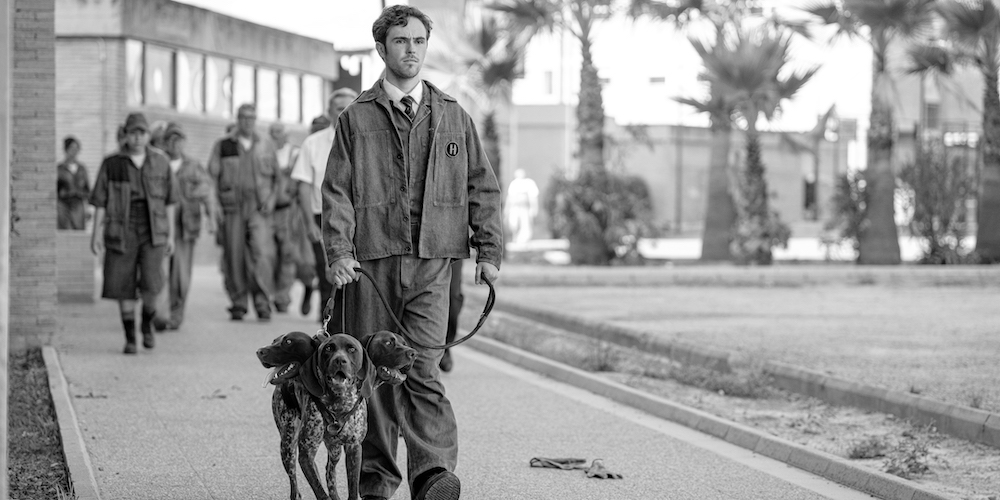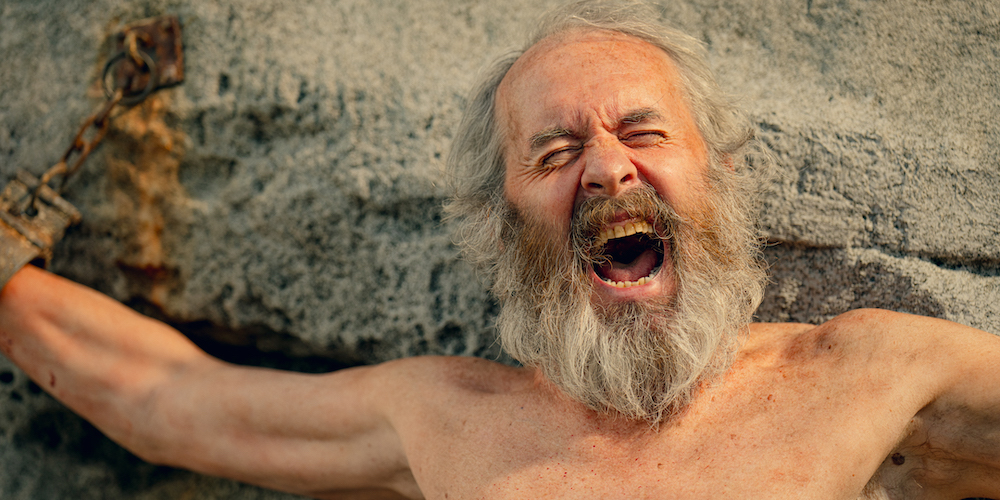Netflix’s ‘Kaos’ presents Greek mythology with a modern twist, blending several stories about well-known characters and mixing them up in a cocktail that delivers a rather interesting series of events. At the heart of the story is a prophecy about Zeus and the downfall of his family. Interestingly, he is not the only one to receive this prophecy. There are three humans— Eurydice, aka Riddy, Caeneus, and Ariadne, who are bound together to Zeus through a common prophecy, which seems to make different sense in different contexts. In the end, however, all of it comes together to mark the beginning of something that will change Zeus, the rest of the gods, and the world of humans forever. SPOILERS AHEAD
How Does Orpheus Get Riddy Back to Earth?

One of the most well-known stories from the Greek myths is that of Orpheus and his undying love for his wife, Eurydice. According to the story, when Eurydice’s life is tragically cut short, her husband, Orpheus, ventures into the Underworld ruled by Hades to bring her back to life. Moved by his dedication, Hades decides to grant his wish, but there is a catch. On the way back to the Earth, Orpheus couldn’t look back to see whether Eurydice was following him. If he did so, then she would be pulled back to the Underworld, and he would never see her again.
The show takes the setting and the characters from its story, but the ending is tweaked to serve the show’s plot. Orpheus, moved by the grief of losing his wife, who he doesn’t know doesn’t love him anymore, decides to find a way into the Underworld. He is supported by Dionysus, who takes him to the Cave, where the Fates decide whether a person is worthy of making the journey to the Underworld. There are several tests that Orpheus has to pass, and he succeeds in them all, except for convincing Hades that he should be allowed to take his wife back. This version of Hades doesn’t care much for romanticism and sticks to the laws of the universe: no dead person should be allowed to go back to the world of the living.

However, Persephone is impressed by Orpheus. She decides to help not just because of his love for Eurydice but also because this is her chance to stick it to Zeus. So, even though Orpheus spectacularly fails in the final task, Persephone orders Medusa to get his wife and get them both on their journey back to Earth. From here, things are pretty much easy as there are no challenges to be overcome and no hurdles to cross. However, Riddy is still not in love with Orpheus. Not only this, but she also takes a liking to Caeneus, with whom she is bound by a common prophecy. In fact, Riddy is so keen on Caeneus and their mission to save people from the frame that she is ready to reject Orpheus and stay in the Underworld. If it hadn’t been for Medusa telling her about her greater purpose on Earth, Riddy would have happily stayed back.
In a massive departure from the original story, Eurydice makes it back to the Earth with Orpheus, but there is a nod to the original ending of the story. Even though she is back on Earth, Riddy and Orpheus are not going to be together anymore. In fact, just as he is about to get in his car and leave, he offers her a ride but cannot look at her. This is a clever reference to the original story where Orpheus was told not to look at his wife. In the show, Riddy tells Orpheus to look at him, and he does so reluctantly, but he does look at her, and at that moment, their separation is sealed. It is clear to Orpheus now that Riddy is never coming back to him, just as it was clear to Orpheus in the original story that he had lost his wife the moment he looked back to check whether the gods had really sent her after him or if they had been playing a joke on him.
What Happens to Caeneus? How does He Save His Mother?

While Riddy goes back to Earth to fulfill her part of the prophecy, Caeneus is left behind in the Underworld. At first, he believes that his part was just to have Riddy realize her fate, but soon after, it turns out that he is left behind not because he is not useful anymore but because he has a more important part to play in the Underworld. With Riddy gone, Caeneus tries to stop people from walking into the Frame but ends up meeting his mother, who killed herself that morning after being told by Riddy’s mother that it’s time for things to be put into motion.
Before she dies, Caeneus’s mother puts a coin in her mouth to ensure that she is given passage across the Frame. When she moves towards it, Caeneus tries to stop her, knowing what is going to happen to her. However, she is adamant about crossing it, and not only does she do it herself, but she also pulls her son with her, and they both end up across the Frame, turning into stony versions of themselves, with their souls being pulled out of their bodies and turned into the Meander water for the gods.
For a moment, it seems that Caeneus is gone for good, considering that no one else has ever come back for the Nothing before. But Caeneus is not like the others. He is special, supported by the prophecy that Fates wrote for him, woven into the fabric of the events that are unfolding simultaneously to ensure that things happen the way they are supposed to. Sure enough, as prophecized, a crack appears in Caeneus, and his soul comes back to him. He turns back to his normal self.

Once saved, he tries to save his mother, too but doesn’t know how. When he touches his forehead to hers, he thinks about everything his life has been so far, all the love and hatred and pain and joy he has received. The power of his love for his mother and his desire to save her works in his favor, and the order set by the god wanes. His mother’s soul stops being pulled up into the water, and she comes back to life. Before he can make sense of what happened and how he did it, Hades shows up and expresses his surprise over Caeneus’ ability to restore people’s souls. This is what Hades had been trying to do, in the hopes of changing the Underworld for the better, rather than simply following Zeus’ outrageous orders.
His failure to do so had confounded him, and he had been looking for a way to make things right with the humans, and with Caeneus, he finally had that chance. It is still not clear how Caeneus is able to do something that even Hades couldn’t, but it’s clear that now, all the souls trapped in the Nothing will be restored. If there is any doubt about it, it is confirmed by the fact that the swirl of Meander in Zeus’ garden, which is fed by the souls from the Nothing, crashes completely, breaking the cycle that Zeus had started a long time ago.
Who Frees Prometheus?

The story of ‘Kaos’ is narrated by Prometheus to the audience. Even though he is tied up on a mountain with an eagle pecking at his liver, he doesn’t seem entirely bothered by his situation because he knows something is afoot. In fact, he plays an active role in helping the Fates stage the whole thing, from killing his lover Charon to pushing Zeus’ buttons to letting him think he could defy the prophecy. As much as he colluded with them, the Fates still didn’t tell him everything, which is why he is shocked when Zeus shows up at the Cave and sets the Fates on fire.
Zeus believes that killing the Fates would mean erasing every prophecy from the world, including his own. If that happens, then neither he nor anyone else would be bound by what the Fates had written for them. Because no one had ever tried this before, Prometheus wonders if what Zeus thinks is true. If so, then with the Fates, the prophecy is gone, and everything that Prometheus did was for naught. To make things worse, Zeus is emboldened by the death of the Fates, who rather easily allowed him to kill them, and makes some very rash decisions, which makes even his own family question his sanity.
Ironically, Zeus shows up at the mountain, sitting right next to Prometheus, telling him how he defied his prophecy. This only angers Prometheus, who talks about how Zeus has let him down when all he tried to do was help him become a better ruler. In the midst of his rant, Prometheus disappears, which shocks Zeus because usually he is the one who does it. Both he and Prometheus wonder who could be powerful enough to do something that only Zeus had done so far, and the answer comes in the form of the Fates.

We don’t see them, but we hear their voice as they tell Prometheus how they cannot be killed, which means that all that has been prophesied by them will come to pass. All Prometheus needed to was be patient and have faith in them. He did have faith for the most part, but he falters when he sees them being set on fire and the Cave burned to the ground. But hearing them again reinstates his belief in them and their plan, and all doubts are removed from his mind. Now, he knows that no matter what happens next, the prophecy about Zeus and his fall will happen. This is confirmed by the crash of the Meander and the cut on Zeus’ finger, which he had seen in a vision previously. The all-powerful Zeus and other gods were never supposed to bleed. But with the small cut on the finger, Zeus is reminded of his mortality and the ease with which he can fall, exhibiting the power of prophecy.
What Does Kaos Reigns Mean?
“A line appears, the order wanes, the family falls, and Kaos reigns”: these are the words repeated throughout the Netflix show, in differing contexts for different people, all of whom are eventually revealed to be connected to each other. What’s interesting about this prophecy is everyone interprets “Kaos” as “chaos.”

When Caeneus talks about his version of the prophecy, he believes that his crossing the gender line resulted in breaking the natural order, leading to him being forced to run away from home and causing the destruction of his family, leading to chaos in his life. In every other instance as well, chaos is implied whenever anyone talks about the prophecy, but it’s clear that the “Kaos” of the promise isn’t a simple typo that the Fates made. It is a proper name referring to someone or something whose arrival is imminent. So, in the end, when Prometheus says, “Kaos is coming,” he refers to the arrival of Kaos, not the general chaos that Zeus has already caused in the world.
According to Greek mythology, Kaos (spelled Khaos or Chaos) is a primordial entity that existed before anything else in the universe. In fact, it is the vast nothingness that space was at the beginning of time. It is from Kaos that everything else emerges, like Night and Light and Darkness and Day. From the Night (known as Nyx) come the Fates, who spin the yarn of everyone’s life, knowing which thread goes where. Like the Fates, Kaos is known for being all-knowing, aware of the beginning of everyone’s story, and, more importantly, their end. Clearly, Kaos is an incredibly powerful being, even more powerful than Zeus, considering that the Titan couldn’t even kill the Fates, who are Kaos’ grandchildren. It makes sense then that Zeus would be concerned about their arrival because it would mean the end of his reign.


You must be logged in to post a comment.